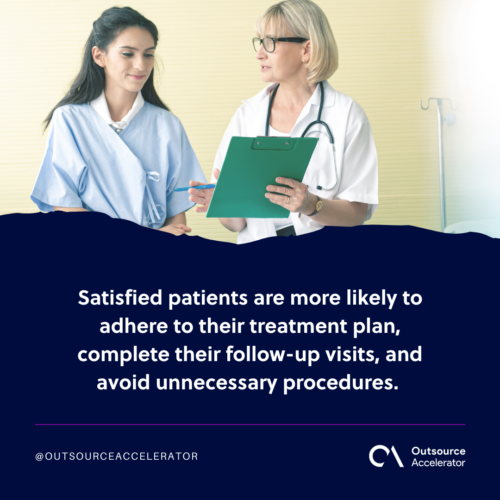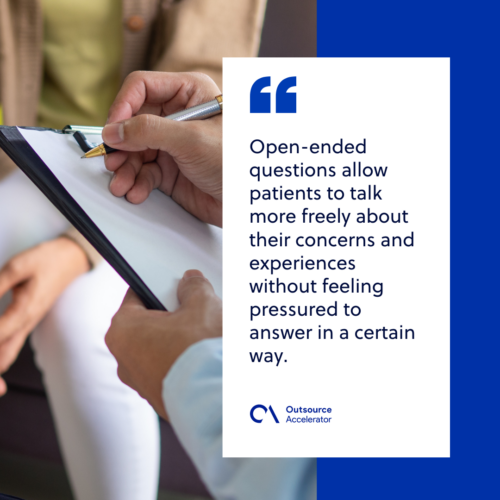Empathy in healthcare: Key to improved patient satisfaction

Empathy is a crucial component in the healthcare industry that can significantly impact the patient experience and overall quality of care.
In the US, 65% of patients said they would consider switching doctors if physicians and clinic staff were rude. Many said that the quality of the care itself was not enough to satisfy them.
Empathy in healthcare goes beyond just providing medical treatments. It involves understanding and connecting with patients on an emotional level. From enhancing patient satisfaction and trust to improving treatment outcomes, a culture of empathy can revolutionize healthcare delivery.
This article explores the transformative power of empathy in healthcare, highlighting its benefits for both patients and healthcare providers.
Why empathy in healthcare matters
Empathy is an emotional response we feel when we see or hear about another person’s experience. It can also be described as a combination of compassion and sympathy.
In healthcare, empathy is important because it helps doctors connect with their patients, which can improve treatment outcomes.
When doctors and staff lack empathy, patients may feel they aren’t being taken seriously. This can cause them to delay seeking medical attention until they’re in serious pain or discomfort.
Here are some major reasons why empathy in healthcare matters:
Enhanced patient satisfaction
Satisfied patients are more likely to adhere to their treatment plan, complete their follow-up visits, and avoid unnecessary procedures.
Empathy eliminates any misunderstandings between a doctor and a patient. This can also lead to fewer malpractice lawsuits filed against physicians.

Cultural sensitivity and inclusivity
Empathy helps healthcare providers develop relationships with those around them.
In healthcare, few topics are more important than cultural sensitivity and inclusivity. This is especially true as we progress toward globalization and a more connected world.
When providing care, cultural sensitivity considers a specific culture’s beliefs, values, and norms. Inclusivity treats everyone equally regardless of race or ethnicity. Both are essential for providing excellent patient care.
Humanizing healthcare
Despite all the methods of communication available to us today, it’s easy to feel a growing sense of isolation and loneliness. The healthcare industry has the opportunity to break down barriers and connect with patients on a personal level.
Empathy brings back the human element in a fast-paced and technology-driven healthcare industry. It reminds medical staff to see patients as individuals with unique needs and feelings.
Tips for improving empathy in healthcare
Improving empathy in healthcare is essential for creating a patient-centered and compassionate environment. Here are some practical tips for healthcare providers to enhance their empathetic skills:
Active listening
Listen carefully and pay attention when patients are talking. Don’t interrupt them or jump straight into a solution.
You’re not expected to solve all their problems or have all the answers. Simply show that you’re listening. Afterward, paraphrase what they said to show you’ve been paying attention, then ask them how they feel.
Practice perspective-taking
This means imagining yourself in another person’s position and seeing things from their point of view.
For example, if a patient misses an appointment, ask yourself, “Why did they miss it?” or “What barriers might have prevented them from coming?”
You may find there are many reasons why patients are like that. By using this technique, you’ll get a better understanding of others.
Cultural sensitivity
You must acknowledge that people from different cultures may have different ways of showing emotions or responding to situations. This means you must be aware of their background and culture before helping them.
Take time to learn about different cultures, especially those in your community.
Empathetic body language
To show that you understand, use body language that reflects what you’re hearing from the patient. For example, lean forward and keep a gentle facial expression.
This can help build rapport between medical professionals and patients by showing that you care what they say.
Use empathetic words
Similarly, use empathetic words when speaking with patients and families about their health issues or personal situations.
Instead of trying to fix everything for them (which is impossible), say the following:
- “I’m sorry.”
- “I know how you feel.”
- “This must be hard for you.”
- “I can’t imagine how difficult this is for you.”
Personalize care
One of the simplest ways to demonstrate empathy in healthcare is by remembering details about your patient’s life outside of the appointment. Show that you care about them as an individual, not just a number on a file.
By being more interested in a personal connection, you also learn details that will help you prescribe better care.
Ask open-ended questions
Open-ended questions allow patients to talk more freely about their concerns and experiences without feeling pressured to answer in a certain way. This allows you to gain as much patient information as possible.
For example, asking, “How is your pain level today?” is better than “Did it hurt today?”
This gives you space to ask follow-up questions.

Provide emotional support
Be emotionally available to patients, especially during difficult moments such as delivering bad news or discussing treatment options. Offer comfort and reassurance as needed.
Don’t treat the appointment like you’re discussing business! Patients often go through challenging times, and offering empathy can ease their emotional burden.
Reflect on interactions
Reflect on your observations and ask yourself if you truly understand the situation.
When possible, ask others for their perspective on what happened and how they felt about it. This will help you become more aware of your own reactions and thoughts to understand others’ reactions in similar situations better.
Empathy training
Training for empathy in healthcare usually focuses on social skills. It teaches people how to identify others’ emotions.
Empathy training also helps develop other healthcare skills, such as communication, conflict resolution, and assertiveness. The goal is for medical staff members to learn how best to communicate with patients about sensitive subjects.
The future of empathy in healthcare
The future of empathy in healthcare is promising, as it continues to gain recognition as a crucial aspect of patient-centered care and healthcare provider well-being.
As the healthcare landscape evolves, several trends and developments are shaping the future of empathy in healthcare:
Emphasis on patient experience
Healthcare organizations are shifting from solely delivering high-quality health services to providing a great patient experience. This means being more responsive to patient needs at every touch point.
As people become more aware of their own health needs, they demand more accountability from providers. Medical organizations are also shifting to using empathy as an attribute during hiring processes.
Technology integration
There is a growing focus on integrating empathy into digital healthcare solutions as technology advances.
Today, new technologies like virtual reality allow clinicians to integrate empathy into treatment plans and services more literally. These tools make practitioners more aware of the patient experience and improve communication.
Technology also allows practitioners to track how often they display certain behaviors, address certain topics, and measure progress.
Training and education
To ensure that empathy in healthcare continues to be integral, we must ensure everyone understands its value and benefit. This requires training and education.
Empathy training programs need to be updated in medical schools. Empathy workshops, simulation-based learning, and role-playing exercises should become standard components of medical curriculums.







 Independent
Independent




